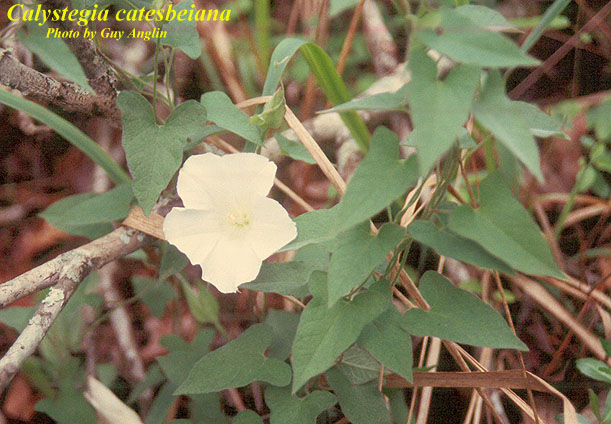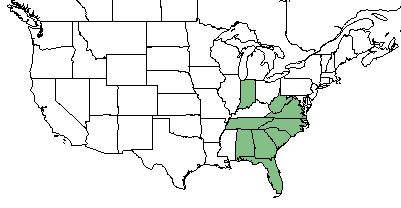Difference between revisions of "Calystegia catesbeiana"
(→Taxonomic Notes) |
|||
| Line 1: | Line 1: | ||
{{italic title}} | {{italic title}} | ||
| − | Common name: Catesby's | + | Common name: Catesby's False Bindweed <ref name= "USDA Plant Database"/>, Catesby's Bindweed <ref name= "Weakley 2015"> Weakley, A. S. (2015). Flora of the Southern and Mid-Atlantic States. Chapel Hill, NC, University of North Carolina Herbarium. </ref> |
<!-- Get the taxonomy information from the NRCS Plants database --> | <!-- Get the taxonomy information from the NRCS Plants database --> | ||
{{taxobox | {{taxobox | ||
Revision as of 19:18, 29 March 2019
Common name: Catesby's False Bindweed [1], Catesby's Bindweed [2]
| Calystegia catesbeiana | |
|---|---|

| |
| Photo by the Atlas of Florida Plants Database | |
| Scientific classification | |
| Kingdom: | Plantae |
| Division: | Magnoliophyta - Flowering plants |
| Class: | Magnoliopsida - Dicots |
| Order: | Solanales |
| Family: | Convolvulaceae |
| Genus: | Catystegia |
| Species: | C. catesbeiana |
| Binomial name | |
| Calystegia catesbeiana Pursh | |

| |
| Natural range of Calystegia catesbeiana from USDA NRCS Plants Database. | |
Contents
Taxonomic Notes
Synonyms: Calystegia spithamaea; Calystegia sericata (House) Bell; Convolvulus sericatus House; Convolvulus spithamaeus Linnaeus var. pubescens (Gray) Fernald
Subspecies: Calystegia catesbeiana Pursh ssp. catesbeiana; Calystegia catesbeiana Pursh ssp. sericata (House) Brummitt
Description
C. catesbeiana is a perennial forb/herb and vine of the Convolvulaceae family native to North America. [1]
Distribution
C. catesbeiana can be found in the southeastern corner of the United States. [1]
Ecology
Habitat
C. catesbeiana proliferates in longleaf pine savannas, marsh edges, and openings in dry to dry-mesic montane forests. [3]
Phenology
C. catesbeiana has been observed flowering in April and May. [4] Stems erect or decumbent, rarely twining; lvs to 5 cm long, basally lobed; corollas white, to 5 cm long and wide; flrs axillary from lower axils only. [5]
Conservation and Management
C. catesbeiana is listed as endangered by the Florida Department of Agriculture & Consumer Services, Division of Plant Industry. [1]
Cultivation and restoration
Photo Gallery
References and notes
- ↑ 1.0 1.1 1.2 1.3 USDA Plant Database https://plants.usda.gov/core/profile?symbol=CACA101
- ↑ Weakley, A. S. (2015). Flora of the Southern and Mid-Atlantic States. Chapel Hill, NC, University of North Carolina Herbarium.
- ↑ Weakley, A. S. (2015). Flora of the Southern and Mid-Atlantic States. Chapel Hill, NC, University of North Carolina Herbarium.
- ↑ Nelson, G. PanFlora: Plant data for the eastern United States with emphasis on the Southeastern Coastal Plains, Florida, and the Florida Panhandle. www.gilnelson.com/PanFlora/ Accessed: 16 MAY 2018
- ↑ Coile, N. C. (2000). Notes on Florida's Regulated Plant Index (Rule 5B-40), Botany Contribution No. 38, 3nd edition. Gainesville, Florida, Florida Deaprtment of Agriculture and Consumer Services, Division of Plant Industry.